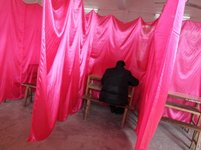Costas
¥
Πέφτουν οι 10άρες σαν το χαλάζι κι ο πληγωμένος καλλιτέχνης αναστενάζει:
Writer sentenced to ten years for subversion
By Reuters in Beijing
A court in the mainland has sentenced writer Li Tie to 10 years in prison on subversion charges for writing essays that urged people to defend their rights, a relative said, the third person to be sentenced on such charges in less than a month. (...)
Writer sentenced to ten years for subversion
By Reuters in Beijing
A court in the mainland has sentenced writer Li Tie to 10 years in prison on subversion charges for writing essays that urged people to defend their rights, a relative said, the third person to be sentenced on such charges in less than a month. (...)


